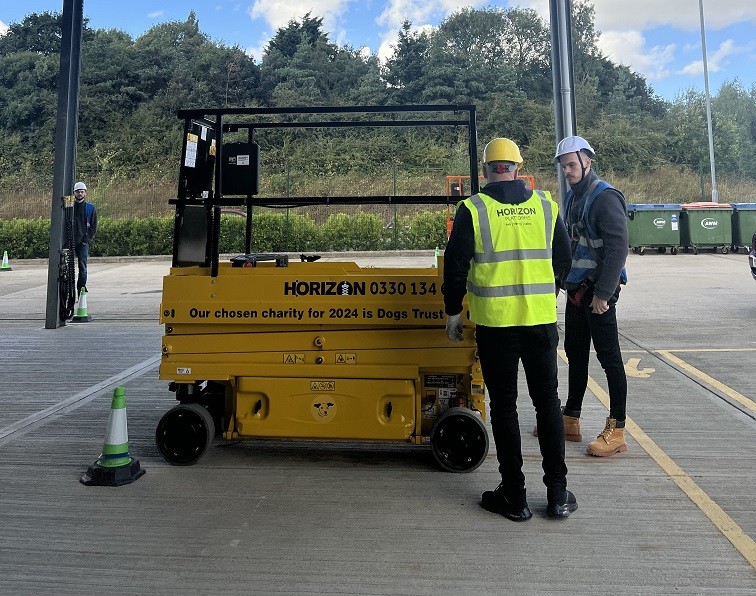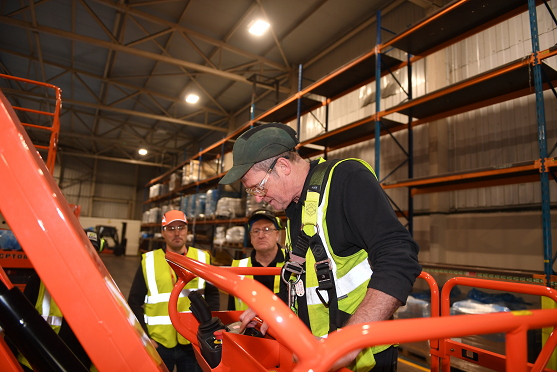Everyone who works with powered access platforms is likely to be familiar with IPAF training. But what different IPAF training courses are available and how can you make sure you choose the most appropriate one? Horizon Platforms shares expert advice on how to choose the right IPAF training course for your needs.
What Is IPAF?
The International Powered Access Federation (IPAF) is an industry-renowned body that has developed a range of IPAF training courses. These courses ensure operators, demonstrators, managers and inspectors are fully qualified to conduct their roles safely.
IPAF is one of two main training providers for working at height that we work with at Horizon, the other being PASMA. Both organisations cover various aspects of working at height; IPAF focuses on powered access platforms and harness use, whereas PASMA offers training for non-powered mobile access towers. For more information about both IPAF and PASMA, check out our Ultimate Guide to Access Platforms Training.
Who Needs An IPAF Qualification?
Anyone who works with powered access platforms must be able to prove they have completed the relevant training. IPAF training is considered the industry standard for MEWP operators, demonstrators and managers, so most industry professionals will hold IPAF qualifications.
Working at height can be dangerous, and MEWPs are complex pieces of kit. It’s absolutely vital that everyone who works with powered access platforms understands how to familiarise themselves with machinery and knows how to operate it safely, which is where IPAF training comes in.
Training isn’t about ticking boxes – it’s about improving health and safety standards, reducing hazards and minimising accidents.
How Many IPAF Training Courses Are There?
There are over a dozen IPAF training courses, with the most popular IPAF categories including:
IPAF 1a Training Courses
IPAF operator training ensures operators know how to safely manoeuvre and operate a static MEWP which uses outriggers for stability. Understanding how to use outriggers correctly is imperative to keep your MEWP stable, avoiding accidents and damage.
IPAF 1b Training Courses
1b: Static Boom training covers the safe operation and manoeuvre of static, self-propelled booms.
IPAF 3a Training Courses
3a: Self-Propelled Vertical training courses predominantly cover the safe use and operation of vertical powered access platforms, such as scissor lifts.
IPAF 3b Training Courses
3b: Self-Propelled Boom courses cover IPAF mobile boom training. These powered access platforms are able to rotate, and specialist training is required to work with telescopic or articulated booms.
IPAF Push Around Vertical Training
As the name suggests, Push Around Vertical (PAV) training ensures the safe operation of static vertical machines – these are typically most suitable for low level access work.
Safety Harness Use and Inspection
IPAF Safety Harness training ensures operators are aware of how to safely and correctly use harnesses, from understanding when to use harnesses to how to inspect fall arrest equipment.
IPAF MEWPs For Managers
How can a supervisor or manager safely co-ordinate the use of MEWPs? IPAF MEWPs For Managers training courses ensure candidates are aware of relevant health and safety protocol and regulations, allowing them to manage safe operation of access platforms. Candidates are able to complete this face-to-face or via e-learning, allowing them to complete the course no matter where they are, at a time that suits them.
More IPAF Training Courses
Similarly, there’s also an IPAF Instructor Training Course which gives MEWP professionals the opportunity to take their careers to the next level. There are stringent entry requirements, but those eligible will be able to qualify to become an IPAF instructor. Eventually, the trainee may well become the trainer!
There are also specific IPAF courses for demonstrators, suitable for professionals who are responsible for demonstrating MEWPs to customers and operators. This is particularly useful for site supervisors and managers. IPAF Pre-Delivery Inspection courses are available to help make sure operators know how to prepare for and conduct a pre-delivery inspection on various types of MEWPs, including visually inspecting machinery. A pre-use inspection checklist helps to ensure equipment is safe to use, reducing the risk of an accident or equipment breakdown.
What Is IPAF Plus?
IPAF PAL+ is an additional day of training which can be added onto 1a, 1b, 3a or 3b IPAF training courses. IPAF PAL+ is a more extensive training session, giving the attendee an even more comprehensive understanding of how to correctly and safely operate relevant equipment – even in trickier circumstances.
PAL+ is optional, though it’s highly recommended for operators working in challenging work-at-height environments, where the risk of accident or injury may be higher.
PAL+ is awarded to those who pass more challenging practical exercises, written tests and interviews.
The Difference Between IPAF 1a and 1b
The difference between IPAF 1a and 1b courses is the type of equipment being covered in each course. MEWP operators specialise in different powered access platforms; operating scissor lifts and cherry pickers requires different skill sets and thus becoming familiar with each type of MEWP requires different training courses.
IPAF 1a focuses on static vertical lifts and 1b focuses on static boom lifts. Candidates will be able to gain a more comprehensive understanding of each type of machine and how to operate them.
The Difference Between IPAF 3a and 3b Training
IPAF 3a gives candidates a deeper understanding of how to operate powered vertical lifting platforms such as scissor lifts, whereas 3b focuses on telescopic or articulated MEWPs.
While many operators may need to operate both scissor lifts and cherry pickers during their careers, there are separate courses available to ensure operators fully understand how to safely operate specific types of machinery.
Does IPAF Cover Harness Training?
It does indeed! The IPAF Harness Use and Inspection course ensures candidates are able to understand how and when to use fall arrest equipment, whilst also being able to fully and safely inspect safety equipment before use.
Safety harnesses are a vital piece of equipment used when working at height; fall arrest equipment prevents nasty accidents from occurring. That said, this equipment must be used correctly for it to be effective. Understanding how to use, inspect and maintain harnesses while working at height is vital.
How Long Is an IPAF Training Course?
IPAF training courses vary in length. Operator courses, such as the 1a, 1b, 3a and 3b, should take no more than one or two days, consisting of a mixture of both theoretical and practical learning and examination. The theory element of our IPAF training courses can be completed in person or via e-learning.
IPAF Safety Harness courses take half a day, whereas PAL+, IPAF Demonstrator and MEWPs for Managers courses last for one day. The longest type of IPAF training course is, unsurprisingly, the IPAF Instructor Course which takes around 13 days to fully complete. The instructor course itself is 5 days (plus 3 additional mentoring days). The 13 days include all the supplementary courses you need to have in order to qualify.
How Long Does an IPAF Certificate Last?
Those who complete an IPAF training course will be given a Powered Access Licence (PAL) card, which proves the individual has undertaken relevant training.
PAL cards are valid for 5 years, and there is an option to renew your PAL card in advance of the expiry date.
When Should I Take IPAF Renewal Training?
MEWP operators and demonstrators should renew their PAL card every five years by taking a half-day renewal course. The individual must have an up-to-date log book consisting of at least 60 entries, with 10 being logged in the last 12 months.
How Much Does IPAF Training Cost?
IPAF training courses vary in price, depending on the type of training and the length of the course. IPAF operator courses can start from around. Our courses start at £99+VAT for MEWPs for managers and go up to £239+VAT for 3 category operator. Our most popular course (IPAF 3a 3b operator) is priced at £184.99+VAT. While more comprehensive courses such as IPAF Instructor Training will cost more. This is because longer and more complex courses require more resources, both in terms of instructor time and course materials.
You can find out more by visiting our dedicated IPAF training page.
Where Do I Find IPAF Training Resources?
The Horizon Platforms team regularly posts the latest information on our blog, including advice on the top IPAF training resources. These resources will provide all the information and tools you need to help improve onsite safety.
Find Your Local IPAF Training Centre
If you’re thinking to yourself, ‘how do I find IPAF training near me?’ – look no further. Here at Horizon Platforms, we have a dedicated ISO-accredited training facility based in Wakefield. With their guidance – resulting in a 96% average pass rate for our training courses – you’ll learn how to safely and skilfully work at height.
We’re also able to deliver any of our IPAF courses at a local site that may be more convenient for you and your team. With a dedicated team of fully-qualified instructors, you can rest assured you’ll receive top quality training no matter where you’re based.
Book your IPAF training with Horizon Platforms now or speak to a member of our friendly expert team for more information.



